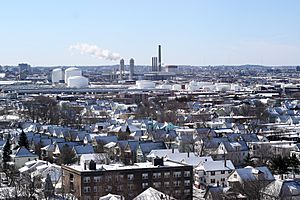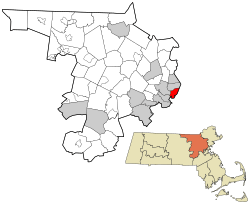Everett, Massachusetts facts for kids
Quick facts for kids
Everett, Massachusetts
|
|||
|---|---|---|---|

Aerial view of Everett, looking towards the Mystic Generating Station
|
|||
|
|||
| Motto(s):
"City of Pride, Progress, and Possibilities"
|
|||

Location in Middlesex County in Massachusetts
|
|||
| Country | United States | ||
| State | Massachusetts | ||
| County | Middlesex | ||
| Settled | 1630 | ||
| Incorporated | 1870 | ||
| City | 1892 | ||
| Government | |||
| • Type | Mayor-council city | ||
| Area | |||
| • Total | 3.66 sq mi (9.48 km2) | ||
| • Land | 3.42 sq mi (8.85 km2) | ||
| • Water | 0.25 sq mi (0.64 km2) | ||
| Elevation | 10 ft (3 m) | ||
| Population
(2020)
|
|||
| • Total | 49,075 | ||
| • Density | 14,366.22/sq mi (5,546.12/km2) | ||
| Time zone | UTC−5 (EST) | ||
| • Summer (DST) | UTC−4 (EST) | ||
| ZIP code |
02149
|
||
| Area code(s) | 617 / 857 | ||
| FIPS code | 25-21990 | ||
| GNIS feature ID | 0612739 | ||
Everett is a city in Middlesex County, Massachusetts, United States. It is located directly north of Boston, right next to the neighborhood of Charlestown. In 2020, the city had a population of 49,075 people.
For a long time, Everett had a special way of making laws, with two groups of lawmakers. But in 2011, people voted to change it. Now, the city has one main group called the City Council with eleven members. Six of these members represent different areas (wards) of the city, and five represent the city as a whole.
Contents
History of Everett
Everett was not always its own city. It was first part of Charlestown, and later part of Malden. In 1870, it officially separated from Malden to become its own town.
How Everett Got Its Name
The community was named after Edward Everett. He was a very important person in American history. He served as a U.S. Representative and a U.S. Senator. He was also the 15th Governor of Massachusetts, a Minister to Great Britain, and the United States Secretary of State. On top of all that, he was the President of Harvard University.
Becoming a City
In 1892, Everett changed from being a town to a city. On December 13, 1892, Alonzo H. Evans became Everett's first mayor. Over many years, the land along the Mystic River in Everett has grown. This happened because new land was created by filling in parts of the river. This process even connected the mainland to what was once a separate piece of land called White Island.
Old Industries and New Energy
In 1919, a company called Beacon Oil started building an oil refinery and storage area near the Mystic River. It opened in 1920. This facility had some big explosions and fires in its early years. Later, in 1929, Standard Oil of New Jersey (now ExxonMobil) bought Beacon Oil. The refinery closed in 1965, but the large tanks for storing oil remained.
In 1971, a company called Distrigas of Massachusetts started bringing in liquefied natural gas (LNG) to its terminal in Everett. This was the first place in the country to do this! As of 2023, this terminal receives almost all of the LNG imported into the United States. This gas mostly comes from Algeria and Trinidad. The LNG is then sent by truck to other storage places or turned back into gas and sent through pipelines.
Encore Boston Harbor Casino
On September 16, 2014, the Massachusetts Gaming Commission approved a big plan. Wynn Resorts decided to build a large casino and resort in Everett. This project, called Encore Boston Harbor, cost $2.6 billion and opened on June 23, 2019.
Before building, the land was cleaned up. The resort includes a hotel, restaurants, a casino, and meeting spaces. It also has public areas along the river called a "harborwalk." This walk has picnic spots, paths for walking and biking, and places to eat by the water. It was the largest private construction project in Massachusetts history.
Future of the Riverfront
Most of the land along the Mystic River in Everett is currently used for large oil tanks. In 2023, a group called the Conservation Law Foundation reached an agreement with Exxon. The company sold the site so it could be cleaned up and rebuilt. The plan is to raise the land to protect it from future flooding caused by climate change. New apartment buildings will also be built there. Exxon also agreed that the land will never be used for storing fossil fuels again.
Everett's population is growing. Many people want to live close to downtown Boston but find other nearby cities too expensive. Everett offers a good option for them.
Where is Everett?
Everett is surrounded by several other towns and cities. Malden is to the north, Revere is to the east, and Chelsea is to the southeast. To the west are Somerville and Medford. To the south, Everett borders Boston and the Mystic River.
The Island End River flows through Everett. For a long time, it was hidden underground, but parts of it were uncovered in 2021. Everett is also an important part of the Port of Boston, which is a major shipping area.
Everett's Size and Neighborhoods
Everett has a total area of about 3.7 square miles (9.6 km2). Most of this is land, with a small part being water. Some of Everett's neighborhoods include Glendale, Woodlawn, the Village, and the Line. Glendale Park is the largest park in the city.
Everett's Climate
In Everett, temperatures usually drop below 50 °F (10 °C) for about 195 days each year. The city gets a lot of rain, typically around 44.2 inches per year. Snow covers the ground for about 52 days each year. The air is not too humid for about 25 days of the year.
People of Everett
| Historical population | ||
|---|---|---|
| Year | Pop. | ±% |
| 1870 | 2,220 | — |
| 1880 | 4,159 | +87.3% |
| 1890 | 11,068 | +166.1% |
| 1900 | 24,336 | +119.9% |
| 1910 | 33,484 | +37.6% |
| 1920 | 40,120 | +19.8% |
| 1930 | 48,424 | +20.7% |
| 1940 | 46,784 | −3.4% |
| 1950 | 45,982 | −1.7% |
| 1960 | 43,544 | −5.3% |
| 1970 | 42,485 | −2.4% |
| 1980 | 37,195 | −12.5% |
| 1990 | 35,701 | −4.0% |
| 2000 | 38,037 | +6.5% |
| 2010 | 41,667 | +9.5% |
| 2020 | 49,075 | +17.8% |
| 2023* | 50,318 | +2.5% |
| * = population estimate. Source: United States Census records and Population Estimates Program data. Source: |
||
In 2020, there were 49,075 people living in Everett. Many different groups of people make up the city's population. About 53.6% of residents were White, 14.3% were African American, and 4.8% were Asian. About 21.1% of the population was Hispanic or Latino. Many people in Everett have roots in countries like El Salvador, Puerto Rico, Colombia, the Dominican Republic, Guatemala, Mexico, Brazil, and Italy.
In 2010, about one-third of Everett's residents were born outside the United States. This shows how diverse the city has become over the years.
The average age in Everett was 36 years old. About 21.6% of the population was under 18, and 14.7% were 65 or older.
Schools and Learning
Everett has ten public schools. These include elementary schools, schools for kindergarten through 8th grade, and Everett High School. The high school moved to a new building in 2007.
There is also one private K-8 school in Everett. The city used to have a private Catholic high school, Pope John XXIII High School, but it closed in 2019.
Things to See and Do
Part of the historic Revere Beach Parkway is located in Everett. This parkway is listed on the National Register of Historic Places, which means it's an important historical site.
Everett's Economy
The Mystic Generating Station has been making electricity in Everett since the early 1900s. It is the largest power plant in Massachusetts.
The Leavitt Corporation has been making its famous Teddie Peanut Butter in Everett since 1924.
Besides the downtown area of Everett Square, there is also a large shopping area called Gateway Center. It has many big stores for shopping.
Getting Around Everett
Everett's main business area is along Broadway, which is part of Route 99. Many shops and restaurants are located there.
The Massachusetts Bay Transportation Authority (MBTA) runs public buses throughout the city. Many bus routes meet at Everett Square. There is even a special bus lane on Broadway to help buses move faster.
While there isn't a subway station directly in Everett, the Wellington station on the Orange Line is just outside the city limits in nearby Medford. There is also a commuter train stop in Chelsea, which is close by.
Route 16 goes through the southern part of Everett. This road connects to U.S. Route 1 and Interstate 93, which are major highways that lead to Boston.
Notable People from Everett
Many interesting people have come from Everett or have strong connections to the city. Here are a few:
- Pat Bradley, a basketball player and sports commentator.
- Vannevar Bush, an important engineer who led U.S. scientific research during World War II.
- Lewis Cine, a football player for the Minnesota Vikings.
- Maddy English, a player in the All-American Girls Professional Baseball League.
- Brian Kelly, a well-known college football coach.
- Mary Eliza Mahoney, the first African American to become a professionally trained nurse in the United States (she is buried in Everett).
- Nerlens Noel, a professional basketball player.
- Ellen Pompeo, an actress known for her role in Grey's Anatomy.
Images for kids
See also
 In Spanish: Everett (Massachusetts) para niños
In Spanish: Everett (Massachusetts) para niños
 | Janet Taylor Pickett |
 | Synthia Saint James |
 | Howardena Pindell |
 | Faith Ringgold |






